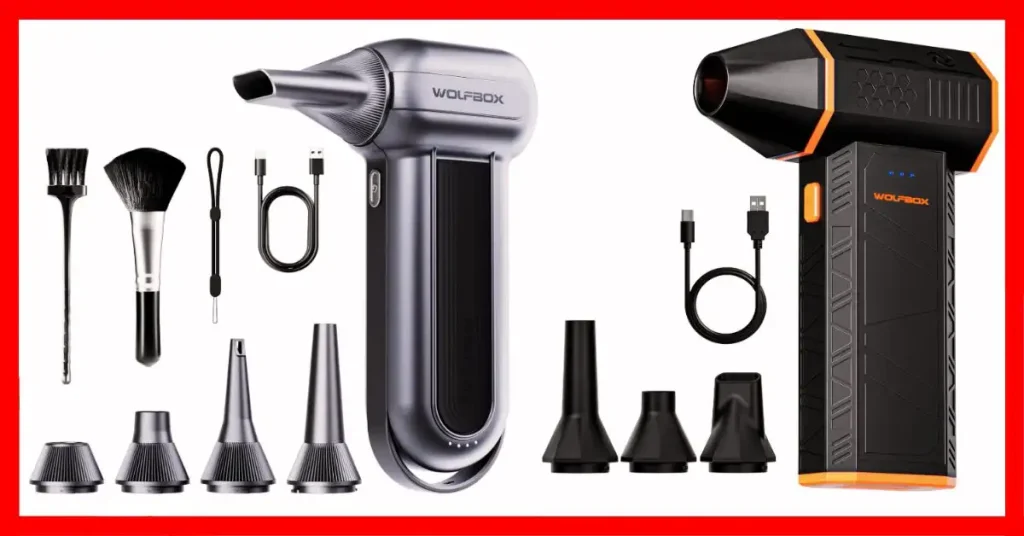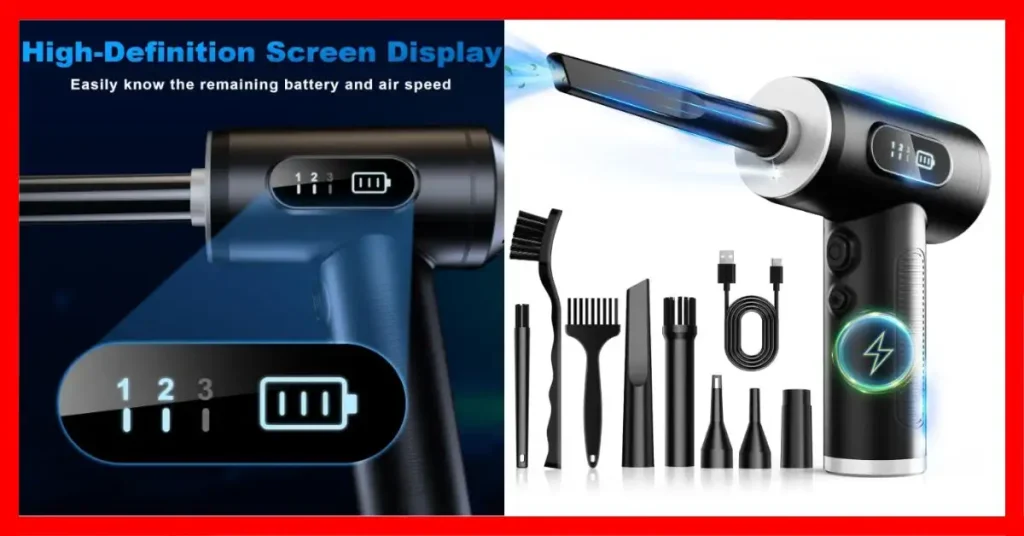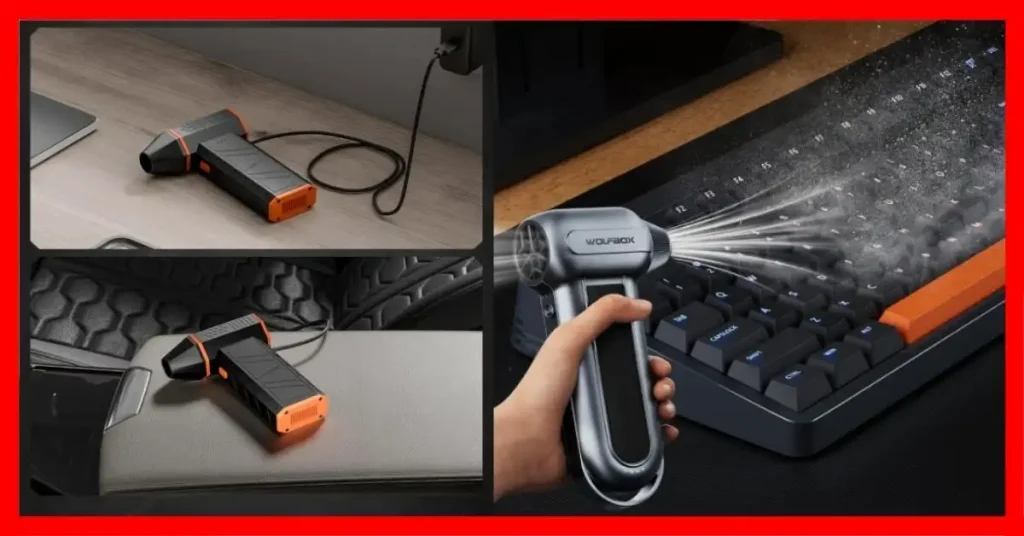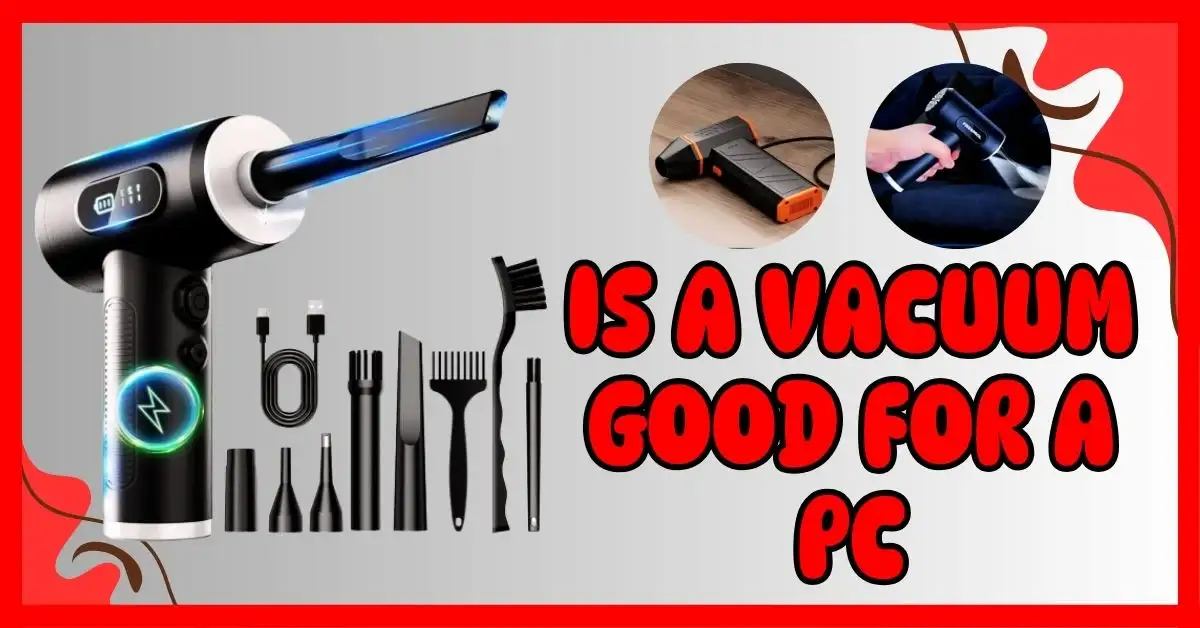Is a vacuum good for a PC? I asked myself this when I tried to clean my first computer. I grabbed a small vacuum and thought I was being smart. Instead, I learned the hard way that vacuums can make static and harm the parts inside. Since then, I’ve used safer tools like compressed air and anti-static vacuums made for PCs. In this guide, I’ll share what worked for me and how you can keep your PC safe too.

Why You Shouldn’t Use a Regular Vacuum on Your PC
Static Electricity Risks (How it can fry components)
No, you should not use a regular vacuum to clean your PC. Vacuums can make static when the nozzle rubs against plastic or dust. That static can jump to your motherboard, RAM, or GPU and kill them in a flash. I once felt a small shock while trying this, and it scared me enough to stop forever.
Strong Suction and Loose Parts (fans, jumpers, connectors)
Vacuums also pull with strong force. That suction can spin fans too fast, snap blades, or knock tiny jumpers loose. Even small connectors can pop out if the vacuum grabs them. I watched a friend’s PC fan crack from this, and it taught me that suction is no joke.
Dust Re-circulation (why vacuums don’t fully solve the problem)
Even if static and suction don’t hit you, dust is still a problem. Vacuums suck up large clumps, but fine dust often blows right back into the air. That dust floats around and lands inside your PC again. I learned this when I cleaned mine once—the case looked neat, but dust came back in two days.
Can I Vacuum My PC Safely? (The Exceptions)
Using an Anti-Static Computer Vacuum Cleaner (safe but rare & expensive)
Yes, you can vacuum a PC safely, but only with an anti-static computer vacuum. These are made to stop sparks that can fry your motherboard or RAM. They are rare and cost more than normal vacuums. I tried one at a repair shop, and it worked well, but for home use, compressed air is cheaper and almost as good.
Laptop Vacuum Cleaners (are they useful?)
Tiny laptop vacuum cleaners are sold online. They look handy but are weak and don’t remove much dust. They are okay for cleaning crumbs on keyboards, but not vents or fans. I bought one once, and it mostly stayed in my drawer. Compressed air is still better for cleaning laptops.
Situations where a vacuum might help (example: external dust filters only)
A regular vacuum can work on the dust filter outside your PC case. There is no risk to the internal parts. I run the vacuum over the mesh to stop dust from blocking airflow. But I never point it at the inside of the PC.
The Best Alternatives to Using a Vacuum on a PC
Compressed Air vs Electric Air Dusters (pros, cons, my personal experience)
The safest way to clean a PC is with compressed air or an electric air duster. Compressed air cans are cheap and easy to buy. But they run out fast and create waste. Electric air dusters are reusable and strong. I use one at home. It blows out dust safely without sparks or broken parts.
Anti-Static PC Vacuum Cleaners (safe options available in the USA)
If you want a vacuum, use an anti-static PC vacuum. It stops static shocks that can fry your motherboard or RAM. They cost more and are rare. I use one for deep cleaning in my office. It is the only safe vacuum option for PCs.
Brushes & Gentle Cleaning Tools (cheap and safe methods)
Soft brushes or microfiber cloths work well too. Small paintbrushes can reach fans, vents, and corners safely. I brush dust first, then blow it away with compressed air. It is cheap, safe, and keeps my PCs clean every few months.
👉🏿👉🏻 Check Latest Price and Offer at Amazon 👈🏻👈🏿
👉🏿👉🏻 Check Latest Price and Offer at Amazon 👈🏻👈🏿
👉🏿👉🏻 Check Latest Price and Offer at Amazon 👈🏻👈🏿

My Personal Experience Cleaning PCs (What Actually Works)
The first time I vacuumed my PC, I thought it would be easy. I used a small household vacuum and went over the keyboard and fans. Soon, I felt a tiny shock. That’s when I realized: regular vacuums can harm PC parts.
After that, I switched to compressed air and an electric air duster. They clean dust safely without touching sensitive parts. I can reach vents, fans, and corners easily. It is faster and safer than any vacuum.
Now, I clean my PCs every few months with just an air duster and a soft brush. Fans spin cleaner, temperatures drop, and the machines run smoother. I have never fried a motherboard or RAM stick since. This method works best for me and keeps my PCs safe.

Best Anti-Static Vacuum for PC (USA Picks)
If you want to clean your PC safely, anti-static matters. Regular vacuums can hurt your parts. Anti-static vacuums pick up dust without shocking your motherboard, RAM, or fans. They are safer and easy to use.
One I like is the OPOLAR Electric Computer Vacuum Cleaner. It is small, light, and anti-static. You can clean fans, vents, and keyboards safely. For laptops, a laptop vacuum cleaner works well in tight spots.
Another good choice is the DataVac Electric Duster with Anti-Static Brush. It works as a gentle duster and a vacuum. I have used it on my desktop many times without any issues.
For a simple option, try a compact PC vacuum cleaner made for electronics. It is not strong like a home vacuum. But it is safe, effective, and easy to buy in the USA.
Using a computer vacuum cleaner anti static is worth it. It keeps your PC clean and prevents shocks. Spending a little extra can save your hardware in the long run.

FAQs
Can I use a vacuum to clean my PC?
No, a regular vacuum can make static and harm your PC parts. Only special anti-static vacuums are safe. Compressed air or gentle brushes are safer and work well.
Can you use a vacuum to clean a PC safely?
Yes, but only with an anti-static vacuum made for computers. Still, compressed air is easier and safer. It cleans without touching delicate parts.
Is a vacuum a computer tool?
No. Normal vacuums are for floors, not electronics. Using one inside a PC can cause sparks, break connectors, or ruin the motherboard.
What’s the best alternative to vacuuming my PC?
Electric air dusters or anti-static cleaning tools are best. They remove dust safely and work well. They are cheap, easy, and effective.
Can I vacuum my laptop?
No. Laptops are more sensitive than desktops. Use compressed air or a laptop-specific vacuum. Regular vacuums can damage your laptop quickly.
Final Thoughts – Is a Vacuum Good for a PC?
No, regular vacuums are not safe for PCs. They can make static electricity. This can damage delicate parts. I have seen this happen, and it is not worth the risk.
The best way to clean a PC is with compressed air, an electric air duster, or an anti-static vacuum. These tools remove dust without touching the parts. They keep your PC safe and cool.
From my experience, using these tools is easier and safer than a regular vacuum. Your PC stays cooler, lasts longer, and you avoid mistakes. After years of cleaning PCs, these simple tools work best.
To Get More About Home and Kitchen Product You Can Visit Our Site. If You Found our Posts Helpful Leave a Comment Below

